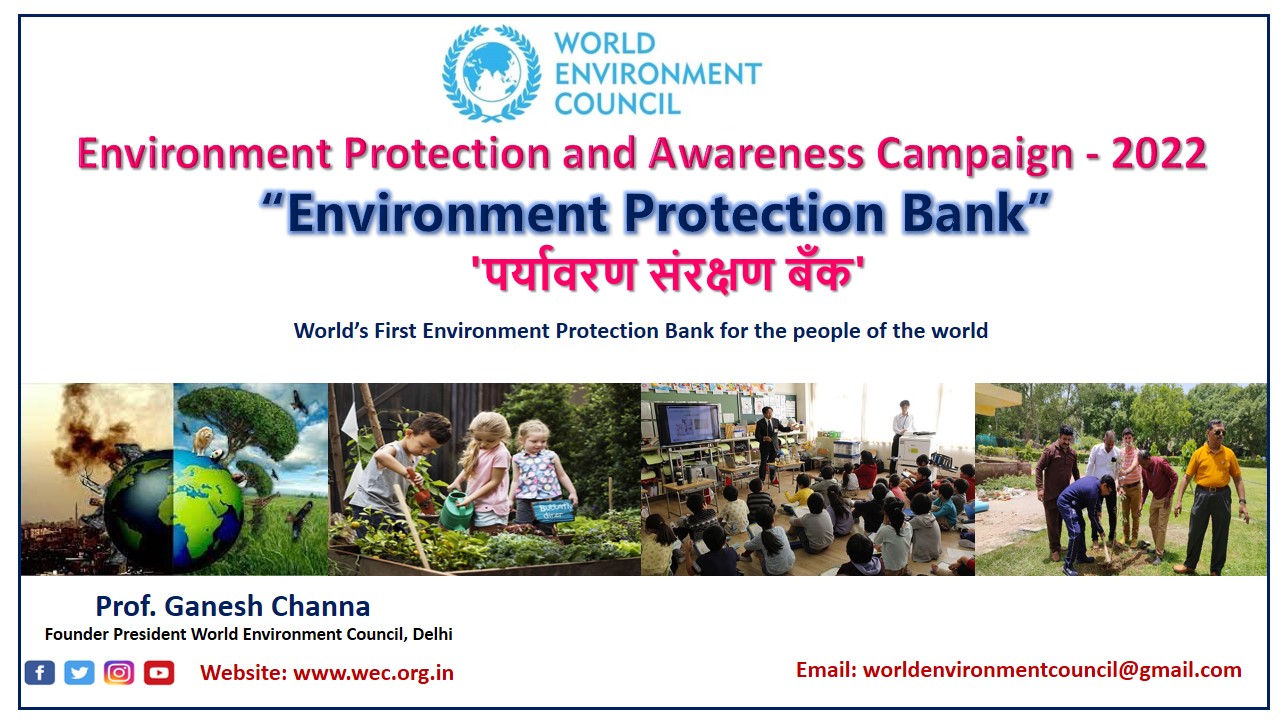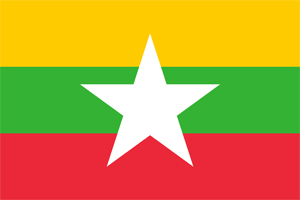Environment Protection Bank
World Environment Council
(
Non-governmental organization (NGO)
)
#SDGAction53219
Description
The World Environment Council's Environment Protection Bank campaign, which is a global initiative to raise awareness about environmental protection and encourage people to take action. The campaign focuses on a number of key topics, including water conservation, renewable energy, and biodiversity restoration.
On behalf of 'World Environment Council, Delhi', an active campaign to create awareness about environment is being organized from 1st August 2022 in all the schools and colleges from all over the India and all over the world. However, a statement is being made on behalf of the World Environment Council that all schools and colleges should actively participate in this activity.
Today's techno-savvy students are constantly busy with their mobile phones. While learning something new, they are quick to ask many questions but do not seem to make any effort to actually ask the same questions. Children and young people especially in the first few years of life learn new concepts, new things very quickly accepted. For example, children can speak a new language more naturally than adults.
Children's brains are like sponges. It is the responsibility of schools to create awareness in their minds towards their future ideals. It is necessary to go beyond just teaching them to read and write and also to teach them awareness on topics like 'Environment Conservation'.
*'World Environment Council'* is a globally active organization conducting various environmental awareness activities in all schools and colleges in India, which encourages students to connect with and protect the environment and also helps create more environmental awareness among the common citizens.
Under the innovative campaign 'Environment Protection Bank' many programs are currently being implemented on the following topics.
1. Let's go to nature.
2. Let's restore mountains and natural places.
3. Let's build a seed bank for future generations.
4. Save old and rare trees.
5. Save animals and all living things. (Bhutdaya paramo dharma:.)
6. Save rivers and oceans.
7. Educate everyone about the environment, embrace innovation and be conscious about the health of the environment.
8. Restoration of Biodiversity.
9. Use of renewable energy.
10. Use of environmentally friendly products.
Apart from this, the council helps to impart environmental education through various activities and campaigns in schools and colleges. You can invite the World Environment Council to your school and college to provide environmental education to future generation.
The school/collage can do any 10 activities from the following 18 activities given below with proper record via sheet/photos/audio/video/PPT/PDF format etc.
Note: We will consider reports of all 10 activities for the conference/award
ACTIVITY 1: MAKE A LEAF COLLAGE
Young students will love this fun art activity. You can choose to go and collect fallen leaves as a mini class field trip nearby location, garden or ask them to bring leaf from home.
Then identify all the leaves that students have found and then test your students to make a picture using only paper, leaves, pens and glue. Maybe you could make leaf design or collage activity?
the innovative concept of Environment Protection Bank proposed by the World Environment Council. We are pleased to inform you that we are looking for potential partners to assist us in capacity-building and technology transfer for the Environment Protection Bank.
We invite those who are interested in collaborating with us to help create a sustainable and safe environment. We believe in the power of collaboration and support from like-minded people to bring positive changes and progress in the environment.
We are pleased to introduce you to the innovative concept of Environment Protection Bank, a coordination mechanism by the World Environment Council. This mechanism provides a platform to facilitate the coordination of international environmental protection efforts and encourages the establishment of global environmental standards.
The Environment Protection Bank works to promote the implementation of environmental protection initiatives across the world, by providing financial and technical support to organizations and countries aiming to reduce their environmental footprints. This will help to reduce global environmental damage, decrease the release of pollutants, and promote sustainable economic development.
The Environment Protection Bank also helps to identify and address any shortcomings in current environmental protection measures by providing an international platform for discussion and collaboration. This will help to ensure that the most effective environmental protection measures are implemented and improved upon.
Activity base evaluation school wise
18 activities list are there school choose any 10 activity and complete within the academic year.
No
SDGS & Targets
Goal 8
Promote sustained, inclusive and sustainable economic growth, full and productive employment and decent work for all
8.1
8.1.1
Annual growth rate of real GDP per capita
8.2
Achieve higher levels of economic productivity through diversification, technological upgrading and innovation, including through a focus on high-value added and labour-intensive sectors
8.2.1
Annual growth rate of real GDP per employed person
8.3
Promote development-oriented policies that support productive activities, decent job creation, entrepreneurship, creativity and innovation, and encourage the formalization and growth of micro-, small- and medium-sized enterprises, including through access to financial services
8.3.1
Proportion of informal employment in total employment, by sector and sex
8.4
Improve progressively, through 2030, global resource efficiency in consumption and production and endeavour to decouple economic growth from environmental degradation, in accordance with the 10-Year Framework of Programmes on Sustainable Consumption and Production, with developed countries taking the lead
8.4.1
Material footprint, material footprint per capita, and material footprint per GDP
8.4.2
Domestic material consumption, domestic material consumption per capita, and domestic material consumption per GDP
8.5
8.5.1
Average hourly earnings of female and male employees, by occupation, age and persons with disabilities
8.5.2
Unemployment rate, by sex, age and persons with disabilities
8.6
8.6.1
Proportion of youth (aged 15-24 years) not in education, employment or training
8.7
Take immediate and effective measures to eradicate forced labour, end modern slavery and human trafficking and secure the prohibition and elimination of the worst forms of child labour, including recruitment and use of child soldiers, and by 2025 end child labour in all its forms
8.7.1
Proportion and number of children aged 5‑17 years engaged in child labour, by sex and age
8.8
Protect labour rights and promote safe and secure working environments for all workers, including migrant workers, in particular women migrants, and those in precarious employment
8.8.1
Fatal and non-fatal occupational injuries per 100,000 workers, by sex and migrant status
8.8.2
Level of national compliance with labour rights (freedom of association and collective bargaining) based on International Labour Organization (ILO) textual sources and national legislation, by sex and migrant status
8.9
By 2030, devise and implement policies to promote sustainable tourism that creates jobs and promotes local culture and products
8.9.1
Tourism direct GDP as a proportion of total GDP and in growth rate
8.10
Strengthen the capacity of domestic financial institutions to encourage and expand access to banking, insurance and financial services for all
8.10.1
(a) Number of commercial bank branches per 100,000 adults and (b) number of automated teller machines (ATMs) per 100,000 adults
8.10.2
Proportion of adults (15 years and older) with an account at a bank or other financial institution or with a mobile-money-service provider
8.a
8.a.1
Aid for Trade commitments and disbursements
8.b
By 2020, develop and operationalize a global strategy for youth employment and implement the Global Jobs Pact of the International Labour Organization
8.b.1
Existence of a developed and operationalized national strategy for youth employment, as a distinct strategy or as part of a national employment strategy
SDG 14 targets covered
| Name | Description |
|---|
Deliverables & Timeline
Resources mobilized
Partnership Progress

Feedback
Action Network

Type of initiative
Timeline
Entity
SDGs
Geographical coverage
Other beneficiaries
Environmental Awareness
Practical oriented students learn environmental related knowledge
Will give the International and National Platform for the students as well as school
More information
Countries







